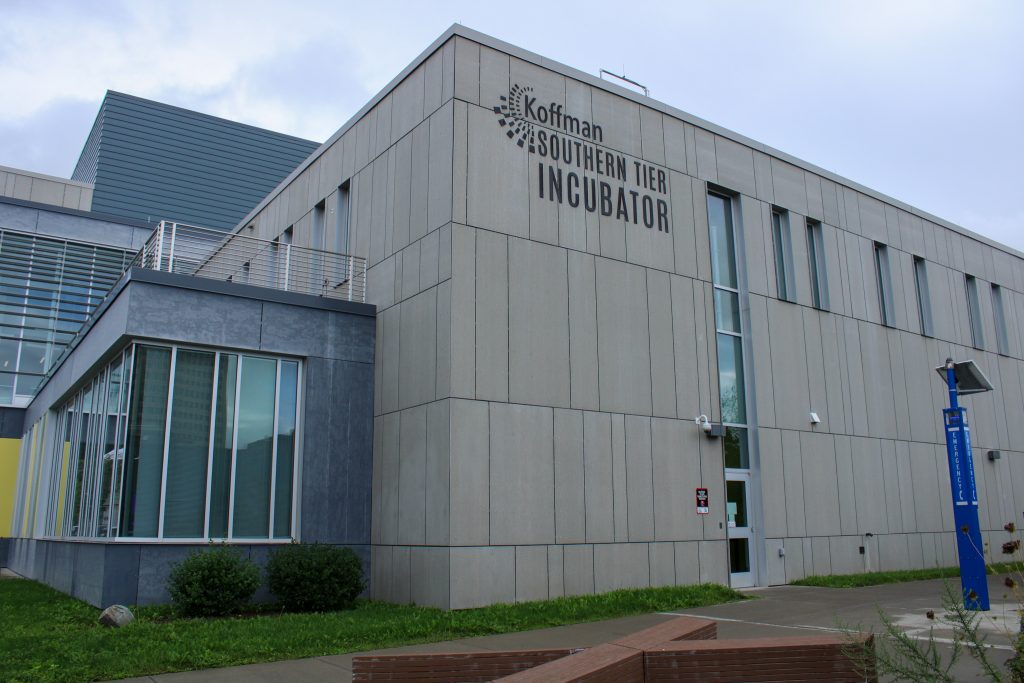Binghamton University has joined nine other northeastern universities in a research and entrepreneurial consortium.
The National Science Foundation Innovation Corps Hub: Interior Northeast Region (IN I-Corps) aims to provide students with the skills to bring new research and technology to business markets. Led by the National Science Foundation (NSF) and Cornell University, the IN I-Corps is planned to launch in January of 2023, and will offer BU students funding, training and a network of connections to help with the creation of new research and business endeavors.
BU’s partnership with NSF started in 2017, when it was offered a $500,000 grant to found the Innovation Binghamton I-Corps Site at the Koffman Southern Tier Incubator. Olga Petrova, director of the Innovation Binghamton I-Corps site and assistant director of entrepreneurship and innovation partnerships at BU, wrote that the I-Corps site has been beneficial for BU students and faculty due to the tools it provides them with to move into entrepreneurship.
“Since 2017, the Innovation Binghamton I-Corps Site program has been helping BU students and faculty learn about the basics of entrepreneurship, explore the commercialization potential of their ideas and inventions, establish and grow new startup companies and connect with experienced entrepreneurs and business mentors,” Petrova wrote in an email. “In addition, the program has been providing funding to select teams (up to $3,000) for their entrepreneurial pursuits, and supporting them in applying to the national-level NSF I-Corps Teams program, which comes with a $50,000 grant.”
The site has held over 25 entrepreneurship training courses and trained over 220 teams across 16 universities, including 46 startups. Due to these results and their previous partnership, the NSF invited BU to become a founding partner of the IN I-Corps.
Erwin Gianchandani, the NSF assistant director for technology, innovation and partnerships, wrote in a statement that he hopes the new regional I-Corps hubs will expand the national growth of the NSF.
“I am delighted the I-Corps Hubs that we are awarding today will expand the footprint of the National Innovation Network, harnessing the innovation potential that exists all across the country by establishing clear pathways for researchers to engage with NSF’s Lab-to-Market Platform,” Gianchandani wrote. “Each regional I-Corps Hub provides training essential in entrepreneurship and customer discovery, leading to new products, startups and jobs. In this way, the I-Corps program will open up new economic opportunities throughout the United States.”
William Kim, a freshman majoring in business administration, said the hub may provide some economic stimulation for less densely populated areas.
“The hub seems like a very interesting and unique way to spur economic growth to rural areas,” Kim said. “It is definitely a strong move that empowers underrepresented groups to perform research.”
According to Petrova, the IN I-Corps will aim to expand all the services currently offered by the Binghamton I-Corps hub. IN I-Corps will implement inclusive education models and workforce preparation, designed for and by individuals in rural areas and small cities such as Binghamton.
Kelly Monterroso, communications specialist for the NSF, wrote that I-Corps Hubs can accelerate the translation of discoveries into solutions for societal issues by training researchers to be in touch with consumer needs.
“The I-Corps curriculum is not about how to write a research paper, business plan or NSF proposal,” Monterroso wrote in an email. “The result is not a publication or a presentation of slides. Instead, I-Corps participants receive direct, hands-on experience in customer discovery — a key step in the entrepreneurial process that involves talking to potential customers, partners and other industry stakeholders. The interview results allow the team to evaluate the commercial potential of their innovation for translation into a successful product and/or service.”
Victoria Kapusta, a junior majoring in business administration, expressed that she is looking forward to seeing how the IN I-Corps supports students with less access to research and business resources.
“The [NSF] Hub seems to demonstrate a great opportunity to provide the resources in order for students to cultivate their scientific knowledge and entrepreneurial spirit,” Kapusta said. “I am looking forward to hearing about how the [NSF] Hub expands its focus on diversity, equity and inclusion through providing talent development to more minority groups.”



